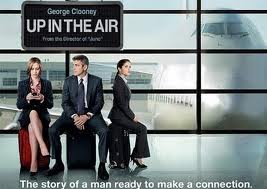
This is a movie that belongs with new-age travel as alternative lifestyle literature. In recent years, people have opted for a life on the open road instead of a stable home. Vagabonding is the new hippy-ism, the new personal statement of lifestyle choice. There is a whole set of inspirational literature, which is packed not only with sermons of motivation but also hands-on guidance about the practicalities of travel and the nitty gritty of gear and other such practical considerations.
Consultants are vagabonds of the corporate world, and some of them carry the idea to a whole new level. Like Ryan Bingham, who travels around the country firing people for pussy bosses. He’s addicted to the idea of travel, and home feels like punishment. His passion for travel has earned him the rare perks of privilege, special access cards, discounted fares, exclusive services, he’s spared the routine that travel amateurs have to go through. He understands loyalty as a devotion he owes to the American Airlines, not to his family, with whom his relations are formal, awkward and undefined. Drunk on his bachelor, no-strings-attached lifestyle, he preaches this lightness of being all over America. Mr. No Baggage, as he is called. Like a modern-day Jesuit, he teaches people how to rise above the burden and weight of commitment, to family, relations, and abstracts like ‘love’. Shudder.
The plot of the film is determined by the introduction of three elements. On one of his travels, he meets Alex, high on the same lifestyle as himself, baggage-less, free, with no history and no future, existing only in the present. The perfect ‘casual’ affair as he describes it, instant gratification and no worries about the future. Natalie, a new recruit, is the prototypical Cornell grad, with her cold-blooded clarity of vision and her complete cluelessness about anything remotely human. On one prolonged assignment, Ryan and Natalie tour several cities together, firing people by the dozens. Alex is supposed to ‘train’ Natalie on that, teaching her how to sell people the lay-off as a letting-go and a ticket to their freedom. If only she could half-believe what she tells them. Natalie’s conscience is not at ease, and she constantly questions the worth of her choice. Whenever her conscience pricks, Alex puts it at ease. The third event that draws events to their climax is the marriage of his younger sister, who he hopes to give away on the wedding day, but finds that someone else is going to be doing the honors, he being hardly ever ‘present’ for them.
At some point in the course of his casual affair, and probably helped in this by Natalie’s talk of home, marriage, and love, he begins to develop feelings for Alex, and seek her. When he shows up at her doorstep, unexpectedly, he discovers she has a family, and that for her, he was a parenthesis, a bubble of life she conjured up and erased at will, distinct from her ‘real’ life. The hurt must have felt real enough to get him rethinking and re-evaluating his whole life mantra.
At his sister’s wedding, he’s given his first chance to redeem a role he lost through absence. Finding himself forced to convince his brother-in-law to-be who’s gotten cold feet the very day of the marriage, he awkwardly grapples for arguments in favor of commitments. He was the guy who always taught people how to avoid commitment, remember. Convincing his brother-in-law to go get his sister, he is jolted into a realization of their value himself.
Getting back ‘home’ to Omaha, he learns that Natalie finally heeded to her conscience and made her way to something more meaningful for a living. Post all this, he begins to realize that unless he invests the essential heartburn, and carries the necessary burden, everything is come and go, everyone only stays as long as it suits them, and he has hardly earned a claim on anyone’s time. Baggage-free is definitely easier going there than ending there.
Perhaps it was time to land, after all those freedom miles up in the air.


Leave a Reply